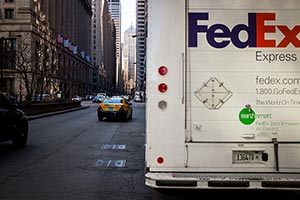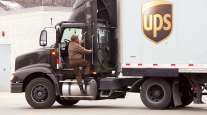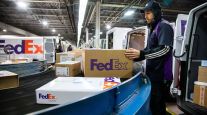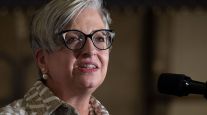FedEx Pushes for Infrastructure Fix as Trump Weighs Investment

The growth of e-commerce is putting enormous new demands on U.S. highways, airports and other infrastructure, which must be modernized with sustainable funding, FedEx Corp. Chairman and CEO Frederick Smith said.
Online sales are projected to increase by 26% from last year to $2.4 trillion worldwide by 2018, adding to the need for infrastructure upgrades to improve a slowing economy, Smith said Feb. 1 in prepared testimony before the U.S. House Transportation and Infrastructure Committee.
FedEx ranks No. 2 on the Transport Topics Top 100 list of the largest U.S. and Canadian for-hire carriers.
“We are at a critical crossroad, given the economic challenges that face our nation,’’ Smith said. “If we want to maintain the U.S.’s status as a global economic and policy leader, we must work together on policy and infrastructure solutions that will modernize and drive our economy forward.”
RELATED: FedEx chief Fred Smith blasts Trump's trade policies
President Trump has promised to repair and upgrade aging roads, bridges, airports and other assets while putting millions of people to work. Trump hasn’t provided details of his plan or how it would be funded, but his advisers have said it could amount to as much as $1 trillion. Trump, they said, wants to leverage more private capital with a new tax credit or other mechanisms.
RELATED: FedEx CEO Fred Smith visits Trump Tower to meet president-elect
Together with Smith, executives from Cargill Inc., BMW of North America, Vermeer Corp. and the AFL-CIO are also scheduled to testify at the hearing on infrastructure needs. Smith, in his prepared testimony, said FedEx and other transport providers need an improved air-traffic control system, updated sea and air ports and well-maintained roadways.
“FedEx and other transportation and logistics companies cannot continue to help grow the U.S. economy and increase jobs without improved infrastructure and wise policy decisions from Washington,’’ Smith said.
Democrats have said they’re willing to work with Trump, including in the Senate, where some lawmakers have proposed spending $1 trillion during the next 10 years. Republican congressional leaders, however, are pushing for private investment to play a bigger role and have said additional federal spending must be offset by cuts to avoid adding to the debt and deficit.
Transportation Secretary Elaine Chao, who was confirmed by the Senate and sworn in on Jan. 31, suggested during her Jan. 11 confirmation hearing that both additional federal spending and more private investment are being considered. She said a “bold new vision’’ is needed to “take full advantage of the estimated trillions in capital that equity firms, pension funds and endowments can invest”’ in infrastructure.
The U.S. interstate system is more than 60 years old and is “in desperate need of updating,’’ Smith said. With freight volume projected to increase by 45% by 2045, more than 40% of major U.S. highways in urban areas are already congested and 30% of U.S. interstates are in poor or mediocre condition, he said.
FedEx supports “a broad mix of revenue sources’’ besides federal fuel taxes to provide sustainable, long-term funding for the Highway Trust Fund, Smith said. He did not identify any particular source of funding.
Improving air traffic control will help, but with the top 20 U.S. airports becoming overly congested within the next 10 years, new runways and facilities will still be needed and existing ones will need maintenance, he said.




